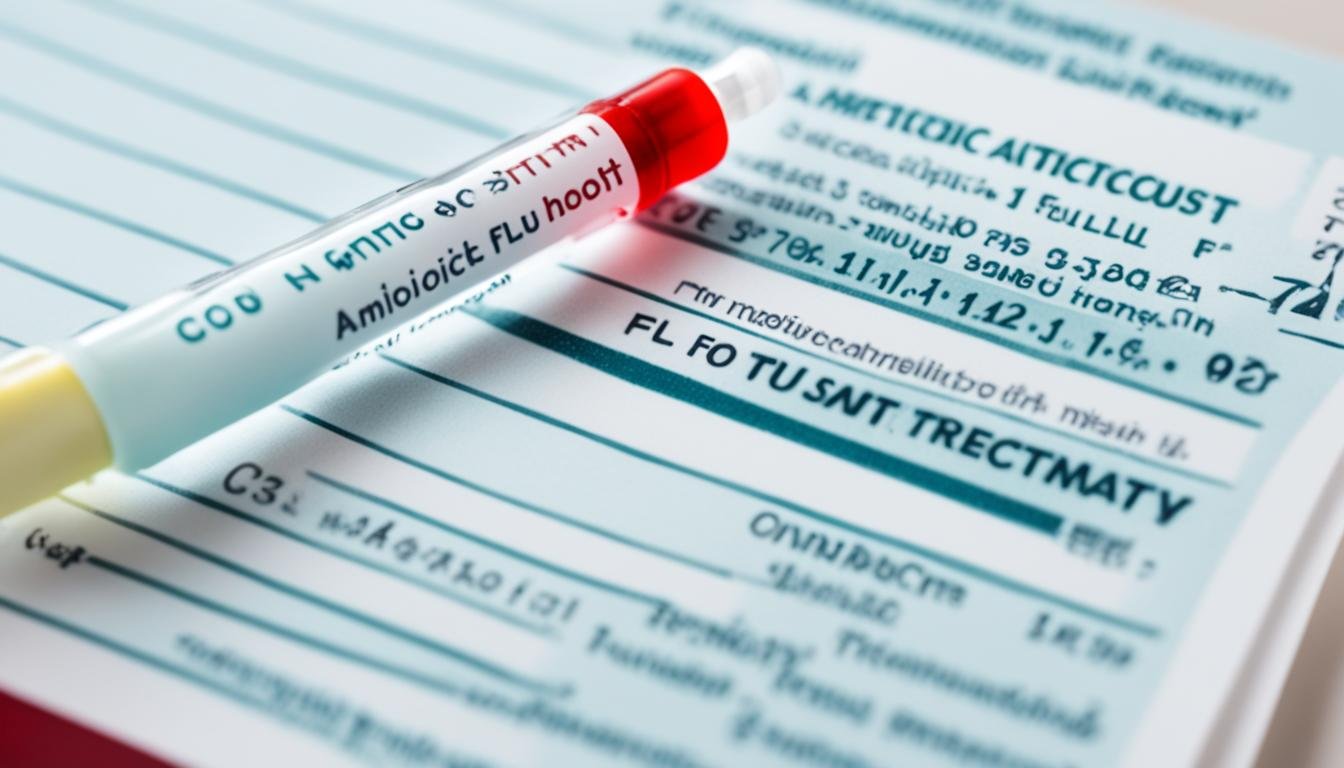Getting a flu shot is quick and easy. It helps protect you and your loved ones. 1 People often ask if they can get a flu shot while on antibiotics. You usually can, since these drugs work differently in the body and don’t interfere. 1 Still, it’s wise to ask your doctor. They’ll advise if you should wait based on your medicine or health condition.
Key Takeaways
- Flu shots and antibiotics usually do not interact with each other.
- Timing of the flu shot may depend on the type of medication you’re taking.
- Consulting your doctor is important to determine the best time to get your flu shot.
- Gut bacteria depletion from antibiotics can reduce vaccine effectiveness.
- Waiting until after completing an antibiotic course is recommended for optimal flu shot timing.
Understanding the Relationship Between Antibiotics and Flu Shots
Antibiotics and Vaccines Serve Different Purposes
Antibiotics and vaccines work in unique ways within the body. Antibiotics fight off bacterial infections. On the other hand, vaccines boost our immune system. They help us make antibodies. These antibodies defend us from certain viruses or bacteria, such as the flu virus.1 So, antibiotics and vaccines don’t normally mix together.
Potential Interactions Between Medications and Vaccines
Yet, there is a twist. A study suggests antibiotics can affect how well flu shots work. It says antibiotics might lower our body’s response to the flu shot.2 The research focused on healthy adults who took antibiotics. It showed their immune systems didn’t respond as well to the flu vaccine.1 This means when you get a flu shot matters if you’re on antibiotics.
Timing Your Flu Shot While on Antibiotics
Getting a flu shot while taking antibiotics is tricky. The best advice is to wait until you’ve finished the antibiotics.3 Waiting lets your body’s good bacteria in your gut grow back. This is important. When antibiotics deplete your gut of good bacteria, your immune system may not respond well to the flu shot.3 So, timing your flu shot is crucial.
The General Recommendation
Research shows it’s better to not be on antibiotics when you get your flu shot.1 This is because antibiotics can mess with the good bacteria in your gut. And this can make your body not react well to the flu vaccine.3 It’s advised to wait until your gut’s good bacteria is back to normal before getting immunized.
Consulting with Your Doctor
Though you might still get a flu shot while on antibiotics, always ask your doctor first.3 They will know if it’s the right time, considering the specific antibiotics and your health. So, it’s smart to consult them for the best advice related to your flu vaccination schedule.

Considerations for Other Medications
When you’re getting a flu shot, the timing is key, especially if you’re on antibiotics. But, it’s not just about antibiotics. Other medicines matter too. Some drugs, like steroids and immune-suppressing medications, might make the flu shot less effective.4
Steroids and Immune-Suppressing Drugs
If you take steroids or meds that weaken your immune system, talk to your doctor. They will help figure out the best time for your flu shot. These medicines can lower your body’s response to the vaccine. This means it might not protect you as well.4
Your doctor can advise if, or when, you should get the flu shot. They will consider your health condition and the drugs you take. It’s all about finding the best solution for you.
Weighing the Pros and Cons
Discuss the flu shot and other medicines with your doctor. It’s important to know how your meds might affect the vaccine. This way, you can make a choice that is right for your health and safety.5
By carefully considering all aspects, you can get the flu shot when it will work best for you. Even if you’re taking other medications, the right timing is crucial.
Should I Wait Until I’m Feeling Better?
The decision to get your flu shot depends on how you feel. If you have a mild cold, it’s usually okay to get the vaccine.3 But, if you have a fever or feel really sick, you might want to wait.3 Always talk to your doctor to figure out the best time for you to get vaccinated.
Getting the flu shot with a mild illness is safe but not always the best idea. Doctors often say it’s better to wait until you’re better.3 Your body can fight your current illness more effectively before taking on the vaccine.3 Your doctor can tell you when it’s okay to get the shot.
Remember that when you’re on antibiotics, you should be cautious about when to get your flu shot.31 Antibiotics might make the flu shot less effective. So, wait until you finish your antibiotics and your body has recovered.31
Working closely with your healthcare provider is key to getting the best flu shot benefits.31 Keep talking to them and follow their advice to stay healthy during flu season.
How Long Should You Wait to Get a Flu Shot After Taking Antibiotics?
The Importance of Gut Bacteria for Immune Response
Taking a flu shot just after antibiotics may not work well. This is because antibiotics kill good gut bacteria. A study by Stanford University showed that taking broad-spectrum antibiotics five days before a flu shot reduced gut bacteria. This reduction lasted up to a year, making the body less responsive to the flu vaccine. This means the timing between your antibiotics and flu shot is crucial for your body to respond well to the vaccine.
Antibiotic-Induced Disruption of Gut Microbiome
Antibiotics can reduce the response to the flu vaccine. They do this by affecting the gut’s microbes. A study showed that the first time antibiotics truly affected the flu vaccine’s response in people was when they took broad-spectrum ones. This affected how well their immune systems responded to getting a flu shot. So, when you take your flu shot in relation to antibiotics is really important for its maximum effect.
1 If you take antibiotics and have low flu immunity, the vaccine might not work as well for you. This leaves you less protected against the H1N1 virus. But, those with high preexisting immunity did not face such a significant issue with their immune response after taking antibiotics.
3 Studies suggest that getting a flu shot before or after using antibiotics isn’t the best idea. The advice is to get the shot when you are not on antibiotics, in the middle of them, or just about to start. This tip is particularly critical for infants, older adults, and everyone hoping for the flu shot to be at its most protective against the flu. Taking the shot while on antibiotics, or right before or after, can mess up your gut’s health in a way that weakens the vaccine’s effects.
1 The CDC states that the flu vaccine lowers the risk of flu by 40 to 60 percent when the vaccine matches the circulating viruses well. Thus, getting the timing right between antibiotics and the flu shot is key. It ensures the best outcome from the vaccine, giving you strong protection against the flu.
Getting Vaccinated While Sick
Getting your flu shot right when you’re taking antibiotics matters, but there’s a bright side. Even if you have a mild sickness, you can usually get the flu vaccine.6 The CDC says it’s okay to get vaccinated with a mild illness. But, talking to a doctor first is smart.6
Mild Illnesses and Vaccines
Kids with slight illnesses, like a bit of a fever, a cold, or an ear infection, should still get their shots.7 Experts from top health groups, like the American Academy of Pediatrics, and Family Physicians say this is safe. They explain that vaccines won’t make the sickness worse.7
Children and Vaccines During Illness
Happily, taking antibiotics doesn’t mess with how well vaccines work in kids.7 So, if a child needs antibiotics, they can go ahead and get their shots, including against the flu.7 This helps kids keep their immune systems strong, even if they’re not feeling well.
Antibiotics and Childhood Vaccinations
Studies show children on antibiotics can still get their shots. This is because antibiotics won’t change how the body reacts to vaccines.8 But, kids facing serious health issues might have to wait. This includes those with weak immune systems or severe allergies. For them, different vaccination schedules may be needed.8
Vaccines for Children on Antibiotics
If a child or adult has a mild illness, taking antibiotics is not a big deal for getting shots. The important thing is not to postpone vaccines. They work well even if you’re taking antibiotics.8
Make sure to follow vaccination schedules even with antibiotics. This is important for keeping children safe from diseases. Antibiotics do not change how effective vaccines are for the body.8
Considerations for Chronic Conditions and Weakened Immunity
For kids with serious conditions, vaccinations might need a different approach. If a child has a weakened immune system or allergies to vaccines, they might need to wait. Or, they might get a special, modified vaccine.8 Always consult your child’s doctor about the best steps. They can make sure vaccines are given in the safest way for your kid.8
Optimal Timing for Flu Shot Effectiveness
It’s essential to pick the right time for your flu shot, especially after antibiotics. The best moment for a flu shot is without recent antibiotic use. This is because antibiotics can lower the effect of the vaccine by reducing gut bacteria.1
Avoiding Recent Antibiotic Use
A study found antibiotics can lower the vaccine’s effectiveness in healthy adults. Those on antibiotics saw their gut bacteria decrease by 10,000 times, which lasted a year.1 This means when you get your flu shot matters if you’ve had antibiotics.
Building Immune Memory Against Influenza
It’s important to have a strong immune memory against flu. The more you remember the flu, the better you can fight it off. So, try to get your flu shot regularly, without recent antibiotics. This helps your immune system stay strong.3
Vaccine Safety Guidelines
When you’re on antibiotics and need a flu shot, it’s key to stick to safety rules. These keep you safe and cut down on risks.4 Reasons not to get a vaccine include your current health, allergies, and past shots.4 Some situations make vaccines too risky to get. Or, they can make a shot less helpful, increasing the chance of side effects.4
Recommendations from Health Organizations
Top health groups say it’s okay for kids to get shots if they’re a bit sick, like with a low fever or a cold. The shot won’t worsen their illness.9 Antibiotics won’t change how effective the vaccine is. So, sick kids on antibiotics shouldn’t wait to get their shots.9
Addressing Allergic Reactions and Severe Illnesses
But, for children with serious health problems, like very weak immune systems or severe allergies, getting a vaccine might need careful consideration.4 Some illnesses, including certain gut or eye diseases, and untreated tuberculosis, might mean waiting to get vaccinated.4 If you’re in doubt, always ask your child’s doctor first before proceeding.9
Staying Healthy During Flu Season
Flu season is nearing, which means it’s time to shield our health and that of our families. The best starting point is to get the flu shot.10 Studies have shown that the flu vaccine is very effective in stopping the flu from spreading and lessening the chances of getting very sick from it.
Preventative Care and Vaccination Services
Today, getting flu shots and other important vaccines is easier than before.10 Service centers like Emergency Hospital Systems now provide flu and COVID-19 vaccines. This makes it easier for people to access the healthcare they need quickly.
Additional Tips for Cold and Flu Prevention
Besides the flu shot, experts offer more advice for staying healthy in the cold and flu season.11 They stress the need for kids to get their vaccines on time, even when they feel a bit under the weather. This is because vaccines do not worsen a mild illness.
By being proactive and getting vaccinated, we can protect ourselves and others from the flu.9 It’s important to note that the CDC recommends everyone, starting from 6 months old, should get a flu shot every year. Doing this before October ends ensures the best protection during flu season.
Antibiotic Course Completion and Immune System Recovery
Getting a flu shot after antibiotics needs careful timing. Researchers suggest waiting if you’ve taken antibiotics lately. This is because those medicines can lower how well your body reacts to the flu shot by messing with your gut.1
It’s essential to give your gut health time to bounce back from antibiotics. So, wait a bit after finishing your antibiotics before getting a flu shot. This way, your body can respond better to the vaccine and stay healthy.
Allowing Time for Gut Microbiome Restoration
Antibiotics can do a number on your gut, lowering its good bacteria. This can then weaken your ability to fight off illnesses like the flu.1Wait until your gut gets back to normal. Then, your body can really respond well to the flu shot, working as it should to keep you well.
Monitoring Your Health After Antibiotic Treatment
Antibiotics can affect your gut long after you’ve finished taking them.1So, it’s a good idea to watch how you feel after antibiotics. Your body might not be as ready to fight the flu, making health checks important. This can guide you on the best time to get your flu shot.
Help your immune system be its strongest to fight the flu. Give your gut time to heal and keep an eye on how you feel once you finish antibiotics. Doing these things will give you the best chance against the flu.1
Conclusion
The timing of your flu shot in relation to antibiotics matters a lot. You can get a flu shot while on antibiotics, but the bacteria they kill might affect how well your body responds to the vaccine.12
It’s smart to wait until after your antibiotic course. Give your body time to rebuild its healthy bacteria.
This way, your flu shot can work better.13 Talking with your doctor is a good idea too. They can help you choose the best time for your flu shot, especially if you’re on other meds or have a chronic health problem.14
Being careful about vaccines and health practices is important.13 Knowing how antibiotics and flu shots work together is key. By taking the right steps, you can make sure your flu vaccine does its best to protect you and your family from the flu’s dangers.
FAQ
Can I get a flu shot while taking antibiotics?
What is the best time to get a flu shot after taking antibiotics?
Do antibiotics affect how my body responds to the flu vaccine?
Can certain medications affect the flu vaccine’s effectiveness?
Should I wait until I’m feeling better to get my flu shot?
Can children take antibiotics and still receive their recommended vaccinations?
How can I ensure optimal flu shot effectiveness?
Source Links
- https://www.everydayhealth.com/flu/antibiotics-may-make-flu-vaccine-less-effective-disrupting-gut-microbes/
- https://www.webmd.com/cold-and-flu/flu-treatment-antibiotics-or-not
- https://scopeblog.stanford.edu/2019/09/05/our-response-to-flu-vaccine-may-be-weakened-by-antibiotics-induced-decimation-of-our-gut-microbes/
- https://www.canada.ca/en/public-health/services/publications/healthy-living/canadian-immunization-guide-part-2-vaccine-safety/page-3-contraindications-precautions-concerns.html
- https://www.medsafe.govt.nz/profs/PUarticles/fluVaccineInteract.htm
- https://www.medicalnewstoday.com/articles/can-you-get-the-flu-shot-while-sick
- https://www.healthline.com/health/flu/flu-shot-while-sick
- https://www.immunize.org/ask-experts/topic/contraindications-precautions/
- https://www.mayoclinic.org/diseases-conditions/flu/in-depth/flu-shots/art-20048000
- https://www.goodrx.com/conditions/flu/antibiotics-and-influenza
- https://www.cdc.gov/flu/treatment/treatment.htm
- https://www.ncbi.nlm.nih.gov/pmc/articles/PMC7336555/
- https://pharmeasy.in/blog/caution-aftercare-what-to-avoid-after-receiving-your-flu-shot/
- https://www.canada.ca/en/public-health/services/publications/healthy-living/canadian-immunization-guide-statement-seasonal-influenza-vaccine-2017-2018.html




